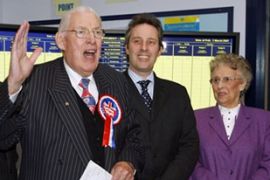Irish vote delivers mixed verdict
UK presses Democratic Unionists to reach power-sharing deal with Sinn Fein.

Deadline
Peter Hain, the UK‘s Northern Ireland secretary, said: “If parties are unable or unwilling to do their jobs by March 26, it’s not a problem for us. We can carry on governing and co-operating with the Republic of Ireland.”
“But it would be a tremendous tragedy for the politics and the people of Northern Ireland.”
Hain said the UK also was prepared to give the incoming Belfast administration tens of millions of extra pounds to spend – but only if Paisley co-operated with Sinn Fein.
“The package will be on the table waiting for the coming executive, but if the executive is not formed then the package falls away,” Hain said.
|
“The alternative is Tony Blair goes out after 10 years and he doesn’t have a legacy in Northern Ireland to point to, and he won’t let that happen” Brian Feeney, a Belfast political analyst |
Paisley, 80, a protestant evangelist, said Sinn Fein was unfit for government because it remained loyal to the outlawed Irish Republican Army, not to the forces of law and order.
Paisley said the IRA’s 2005 moves to disarm and renounce violence and Sinn Fein’s decision last month to begin co-operating with the Northern Ireland police were not good enough
Asked whether he would share power with Sinn Fein, Paisley said: “Not the Sinn Fein as we know it today. Not the Sinn Fein that will not tell the forces of the crown where these deeds are being done, when they have the information.”
Paisley accused Britain of wishing to see him defeated. “They don’t like having to deal with a person that they can’t break or make bow,” he said.
Results
Instead, assembly election results on Friday boosted Democratic Unionist power. The party won 36 of the assembly’s 108 seats.
That strength means the party can claim five of the administration’s 12 posts, an unprecedented share under the power-sharing rules of the 1998 Good Friday peace accord.
Sinn Fein, which won 28 assembly seats, is entitled to four government posts.
Moderates who led a power-sharing coalition that collapsed in 2002 – Protestants of the Ulster Unionists and the Catholics of the Social Democratic and Labour Party (SDLP) – won 18 and 16 seats, respectively.
 |
| Sinn Fein’s nominee for “deputy first minister nominee”, Martin McGuiness [AFP] |
The Ulster Unionists, for decades the dominant party in Northern Ireland, have become eligible for two administration posts. The SDLP, the most ardent champion of power-sharing and the Good Friday accord, would have just one post.
The British and Irish governments expect Paisley to agree to accept a nomination as “first minister,” the top power-sharing post, and sit down alongside Sinn Fein’s nominee for “deputy first minister nominee”, former IRA commander Martin McGuinness.
The governments originally hoped this would happen when the assembly convenes on Wednesday. But Hain, sensing a likely refusal, said this could be delayed until March 25.
Brian Feeney, a Belfast political analyst, said he expected Britain to devise some halfway deal to avoid following through on its threat to close what he called “the most polarised assembly there’s ever been.
“Tony Blair doesn’t want to shut the assembly. The alternative is Tony Blair goes out after 10 years and he doesn’t have a legacy in Northern Ireland to point to, and he won’t let that happen.
“He has no achievement without the north of Ireland.”